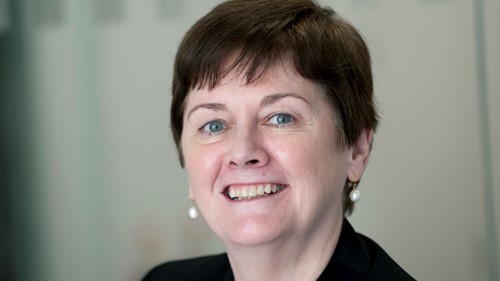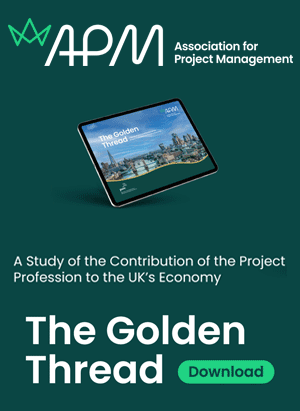Association for Project Management
|
|
Q & A with Sue Kershaw, President of APM
Sue Kershaw has served as APM’s first female President since 2019. With Sue’s support, APM has celebrated its 50th anniversary, surpassed 3,000 Chartered Project Professionals and successfully navigated challenges such as the pandemic. Her work has helped cement APM’s reputation as an outstanding professional body both in the UK and globally.

From July, Dr Yvonne Thompson CBE will join APM as its new President.
APM spoke to Sue about her time in the role, including her highlights and how she thinks the project profession has changed in recent years.
What have been some of your personal highlights during your time as President of APM?
There have been many positive highlights. APM’s 50th anniversary was certainly a highlight, including the 50 Projects for a Better Future book which was published at the time, celebrating five decades of projects making a difference. I think it really helped to showcase APM and the project and programme management world at its best.
The new APM branding which followed the anniversary looks fantastic. It’s really powerful and impactful and has raised awareness of the organisation. Adam Boddison joining as our new CEO has also brought in a new energy and dynamism, as well as the opportunity to reach out to organisations outside of project management, and academia.
It has also been heartwarming to see the number of Charterships exceed expectations. I remember being at the celebration for the first cohort at APM and the room was so full of energy, hope and excitement it was phenomenal!
How has the profession changed over that time?
I think the profession has definitely grown and become more mature and robust, with wider recognition of the value of project management. I think general awareness of projects has improved, especially with so many big projects in the news and the need to understand how projects are going to impact communities. This growing sense of awareness of projects and project management has also been reflected at an academic level. As an Honorary Professor at Bartlett School of Sustainable Construction UCL, I helped to develop the first-ever MBA in Major Infrastructure Delivery, designed to equip professionals with innovative management and leadership practices to successfully deliver major infrastructure projects.
This will enable project professionals attain an MBA tailored to their needs and the needs of their infrastructure organisations.
The profession has also changed in becoming more open to people from diverse backgrounds which is great to see. More women are entering the profession, but there is still more to be done to retain them. APM is making an impact here in particular with its Women in Project Management conference. We are also seeing projects being included in STEM conversations in schools and colleges.
Do you think project management has become easier or more challenging than it was five years ago?
I think it's become more challenging because the complexity of what we are project managing is increasing. In fact, it's moving towards programme management where you have a series of projects, and you can't just tie those projects together with a piece of string and say that's your programme. It's completely different, you are looking at outcomes rather than outputs, and wider benefits such as ESG and social value.
Increased complexity means you also need people with different skill sets. You have got to be agile and smart, and you have to unlearn some of the things you've learned. For example, all project managers used to schedule and then find the critical path, resource and cost load it, and then monitor it to completion. This has changed, and it's now a strand of critical paths that don't actually join up, which means you need to be much more proactive and agile in managing the schedule and the changes to it.
As complexity increases, there are more issues to consider, and I think the impact of that that hasn't been addressed yet regarding governance. The governance we have for mega billion-pound programmes is the same governance as we have for small projects so that needs to change. I think this is demonstrated in recent UK mega projects where it took so long to get the data and information to the decision makers to make a decision in time. Project 13 has come up with a new code of governance that I would like to see more widely adopted. I think the systems approach should also be woven into projects and programmes to help delivery and decision making.
As projects become more challenging this also has implications for project related education and training, for example, the need to embrace behavioural management and cultural change. At the end of the day projects are all about people and if you don't know the type of person you are working with on your team and how to get the best out of them you will not succeed.
If you understand your team, then they understand you. The types of leadership now that are considered as being really advantageous, such as fully collaborative, empowering and creative, were not widely welcomed five years ago, and I think the styles will morph and grow and become even more effective in the future. But we have come a long way in understanding the importance and value of empathy, listening and compassion in leadership.
What do you think the next ‘big thing’ will be for the project profession?
I think next big thing is going to be how we deal with giga programmes. We’ve gone from mega to giga multi-billion £/$ programmes in the last five years. They are not the same animal, and you can't deal with them in the same way. There may be an argument for cutting them up into bite-sized chunks and taking a federated approach, particularly towards governance. It is critical too that the programme directors responsible for delivering these programmes have the authority and integrity to do so and it is recognised they need a high degree of autonomy to deliver well.
I also think one of the big things coming up at the moment is the role of integrator. You look at the petrochemical industry and you have the integrator who does everything, and literally integrates all of the different delivery requirements over the project life cycle, which you don't have in UK infrastructure at the moment. We do have delivery partners though, so I think this is something that grows from this. I think APM can play a major role in defining the integrator role.
There is also the argument that whoever is running your project or programme, should be represented on the c-suite, in the role of Chief Project Officer, and that role is going to become more recognised, as we are seeing it in defence in particular, where the programmes are so big.
What excites you most about the future of the profession?
I like the limitless aspect of the profession and because it is relatively young, it’s exciting to see the agility in which the profession can move, and not to have to stand back and wait. I think if we grab the digital agenda, the AI agenda and the governance agenda, and hopefully that's something that we can do at the grassroots level, it’s a really exciting, growing profession to be involved in.
So, what is next for you?
In addition to my new role as Senior Vice President Program Executive at AECOM, I will continue in my role of Honorary Professor at UCL, and seeing the new MBA really embedded and working well.
I’m also interested in developing the role of programme/project director and what sort of people you need and what skills, as it’s a combination of strategic and delivery which is quite rare. I am also working on a book that will celebrate women in construction and examine the traits they have that make them so successful.
In addition, I am looking forward to my next big job delivering a global mega/giga programme for AECOM.
Original article link: https://www.apm.org.uk/news/q-a-with-sue-kershaw-president-of-apm/
- RESOURCES
- MEMBERSHIP
- CHARTERED STANDARD
- QUALIFICATIONS AND TRAINING
- JOBS AND CAREERS
- NEWS AND OPINION
- COMMUNITY
- EVENTS
- BOOKS


